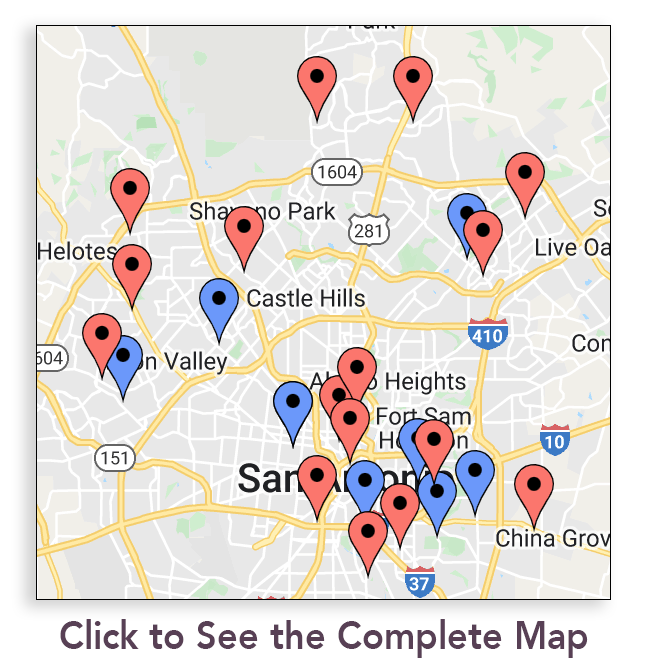 With temperatures expected to be above 100 degrees this week, the City of San Antonio Cooling Centers cooling centers will be open to provide residents relief from the heat.
With temperatures expected to be above 100 degrees this week, the City of San Antonio Cooling Centers cooling centers will be open to provide residents relief from the heat.
VIA Metropolitan Transit is offering fare-free service to the cooling centers as long as they remain open. Complimentary trips are available on any regular VIA, VIA Link or VIAtrans service for people who need a ride to a cooling center in their area.
LEARN MORE AND SEE FREQUENTLY ASKED QUESTIONS
VIA passengers should inform the operator that they are traveling to a City cooling center when they board. VIAtrans customers will be allowed to make same-day reservations for cooling center destinations only. VIA continues to encourage riders to wear a mask when riding a bus or van.
VIA also recommends staying hydrated. Beverages are allowed on buses and vans in spill-proof or screw-top containers. Carrying an umbrella and dressing in loose or light-colored clothing also helps to keep cool.
To plan your trip with VIA, download the free VIA goMobile+ app, or call our GoLine at (210) 362-2020. VIAtrans customers can book their trip by calling (210) 362-5050 for assistance.
The Electric Reliability Council of Texas (ERCOT) has asked Texans to conserve power when they can by setting their thermostats to 78-degrees or above and avoiding the usage of large appliances (such as dishwashers, washers and dryers) during peak hours between 3 p.m. and 8 p.m. through the weekend.
As a reminder, adults, 65 and older; children, 4 and younger; and people with existing medical conditions, such as heart disease and those without access to air conditioning, are at higher risk on days with high temperatures and heat indexes.
Drinking plenty of water and protecting oneself from the sun are critical precautions. Additionally, people should call and check on their neighbors who may be at high risk and ensure access to heat relief and hydration.
Heat cramps, heat exhaustion and heat stroke are possible health effects. Warning signs of heat stroke include red, hot, and moist or dry skin, no sweating, a strong rapid pulse or a slow weak pulse, nausea, confusion or acting strangely. If a child exhibits any of these signs, cool the child rapidly with cool water (not an ice bath) and call 911 or your local emergency number immediately.
Never leave children or pets alone in vehicles. If you see a child or pet locked in a hot car or in the back of a truck, act immediately. Write down the car’s description— including its license plate number and call 911. If the situation involves an animal, call Animal Care Services at 311. Per city ordinance, both Police and Animal Care Officers have the right to break a car’s window if a child or animal is endangered inside a vehicle.
The City of San Antonio has opened cooling centers available to the public during normal business hours. Community members can visit the San Antonio Office of Emergency Management websites for a map and listing of cooling centers.
ANIMAL CARE SERVICES
Persons who leave animals left in vehicles could face animal cruelty charges if their pet sustains injury or death. Animal Care Services is urging residents to use the greatest of caution with pets outdoors. High outdoor temperatures can easily put pets at risk for overheating. The following are some tips to help pets beat the heat:
♦ Fresh water and shelter should always be available.
♦ Shade is not just a good idea for outdoor pets. It’s the law. As is access to fresh water and shelter beyond the all-day available shade. Chain tethers are not allowed.
♦ Pets most at risk from overheating include young, elderly, or overweight pets, those with a short muzzle, or those with thick or dark-colored coats.
♦ A shaded parking spot offers little to no protection on a sunny day and cracking the window “a little bit” does very little to reduce the temperature inside a parked car. It takes only ten minutes for the interior of a car to reach 102 degrees on an average 85-degree day and in thirty minutes, that temperature can reach 120 degrees or more.
♦ It is illegal for dogs to ride unsecured in the back of trucks and these pets face the same heat stroke risks as pets locked in cars-That’s in addition to the threat of burned paws and accidental falls in transport.
♦ Symptoms of heat stress include excessive thirst, heavy panting, glazed eyes, vomiting, restlessness, lethargy, fever, dizziness, a rapid heartbeat, profuse drooling or salivating, and unconsciousness.
♦ If an animal does show signs of heat stress, gradually lower their body temperature and get them to a vet immediately.
♦ Mind your pets around water–most pets are not natural swimmers and any pet can easily tire and drown.
BEXAR COUNTY
The Bexar County Fire Marshal reminds residents that the County is still under a burn ban. Outdoor burning is not recommended at all. With dry winds forecasted through the weekend, a simple spark can ignite a grassfire. All residents are reminded to be to be diligent and careful to avoid any activities that may spark a fire.
Be sure to mind not just your pets but your livestock as well. For information on keeping cattle, horses, pigs and other livestock, safe in extreme temperatures, please visit www.bexar.org for information.
CPS ENERGY
CPS Energy is closely monitoring the expected high-power demand due to the high temperatures and reminds customers they can save energy and money on their utility bills by following tips that can be found on the Energy Saving Tips webpage. Additionally, to stay informed, customers are encouraged to sign up for Energy Alerts or call (210) 353-2222 to provide their emergency contact information for the utility to reach them in the case of an emergency.
SAWS
While the expected high temperatures won’t affect indoor water service, Stage 2 outdoor watering rules are in place due to Edwards Aquifer levels. Watering outdoors during the week is allowed only between 7-11 a.m. and 7-11 p.m. on your designated day. Watering with a hand-held hose is still allowed any time on any day. More information is available at www.saws.org/stage2.
